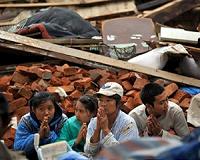| . |  |
. |
Tokyo (AFP) March 29, 2011 An acute shortage of toilet paper has hit Tokyo, as Japan's people react to the earthquake and tsunami by stocking up on essentials. In a posh supermarket in the centre of the capital, a lone sign stands where prior to the disaster there were mountains of toilet paper, tissues and paper towels. "Due to the vast earthquake in the northeast, we are currently out of stock. We apologise for the inconvenience," the sign reads. A 7-Eleven shop nearby is similarly stripped, while an outlet of rival chain FamilyMart is down to just four packs of tissue paper. "Sorry, but it's one pack per customer. You can't have two," says the shop assistant with a sheepish smile. Within hours of the 9.0-magnitude earthquake striking on March 11, sending a massive tsunami across Japan's northeastern seaboard, hordes of anxious consumers had rushed to the supermarkets. They bought products they would need if they were to find themselves holed up at home for a lengthy period of time, including instant noodles, water, canned food, batteries -- and toilet paper. As supermarket shelves were gradually emptied, people started turning elsewhere to meet their demands, reflected in appeals by companies for their employees to refrain from stealing toilet paper from the lavatories. Acting almost as if by reflex, people prepared for any contingency, including a sharp increase in the price of daily necessities brought about by production halts, transport breakdowns -- and hoarding. Japan has seen similar situations before. Many still remember 1973, when the great oil crisis spilled over into a great toilet paper crisis, with families accumulating huge stocks at home. The current shortage in Tokyo is the result of damage to large paper mills in prefectures that were severely affected by the tsunami, including Miyagi, Fukushima and Ibaraki. Industry data show that the day after the disaster, the residents of Tokyo also bought five times more instant noodles than normal and up to eight times more mineral water, causing prices to spike. Production and delivery have been slow to pick up since then, because of damaged plants, impassable roads, fuel rationing and an inadequate supply of electricity. However, early indications are that the situation is gradually improving, thanks to increased production at paper mills in western Japan, an area largely untouched by the disaster and its consequences. Production should also pick up in the northeastern disaster zone, although some paper mills near the Fukushima nuclear plant face an uncertain future as workers struggle to contain an unfolding crisis there. "The situation is still very far from perfect," said a saleswoman at a Tokyo FamilyMart.
Share This Article With Planet Earth
Related Links Bringing Order To A World Of Disasters A world of storm and tempest When the Earth Quakes
 Aid workers praise Myanmar quake response
Aid workers praise Myanmar quake responseYangon (AFP) March 28, 2011 Aid workers praised Myanmar's regime on Monday for its speedy response to the recent earthquake that killed more than 70, in contrast to the aftermath of previous disasters to strike the country. The powerful 6.8 magnitude quake struck near the borders with Thailand and Laos late on Thursday leaving an official toll of 75 dead, including one woman in Thailand. "The government's response ... read more |
|
| The content herein, unless otherwise known to be public domain, are Copyright 1995-2010 - SpaceDaily. AFP and UPI Wire Stories are copyright Agence France-Presse and United Press International. ESA Portal Reports are copyright European Space Agency. All NASA sourced material is public domain. Additional copyrights may apply in whole or part to other bona fide parties. Advertising does not imply endorsement,agreement or approval of any opinions, statements or information provided by SpaceDaily on any Web page published or hosted by SpaceDaily. Privacy Statement |